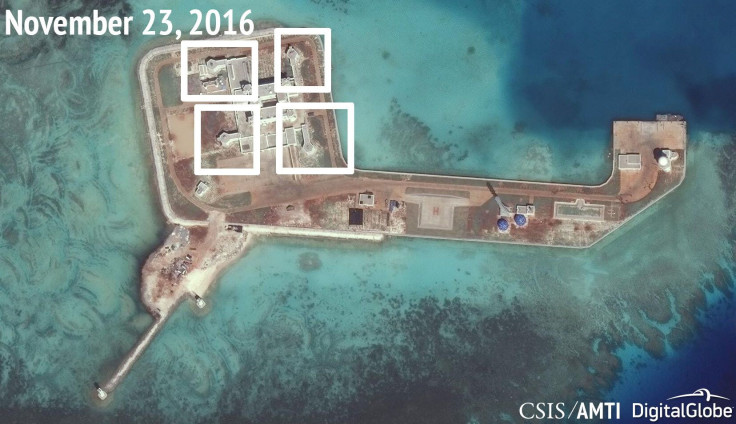China's Island Building Turns Malaysia, Indonesia Into Front-line States
Any discussion of the turbulent waters in the South China Sea begins with the Nine-Dash line, used by Beijing to claim almost the entirety of the sea, from Hainan Island down to the top of Indonesia. A 2016 ruling by the Permanent Court of Appeals (PCA) in the Hague found the demarcation line to be invalid according to international law and was given in favor of the Philippines' exclusive economic zone (EEZ).
China has largely ignored the PCA ruling and has encroached on the EEZs of Vietnam, Malaysia, Brunei and Taiwan, and Indonesia in recent years in addition to the Philippines.
About a year before the 2016 PCA ruling, the Chinese government began to build artificial islands on reefs and shoals in the South China Sea, militarizing them with airstrips, harbors and radar facilities.
Greg Polling, director of the Asia Maritime Transparency Institute (AMTI), told the CNN, "These (islands) are bristling with radar and surveillance capabilities, they see everything that goes on in the South China Sea. In the past, China didn't know where you were drilling. Now they certainly do.
The artificial islands allow the Chinese ships to use increasingly forceful tactics against major regional powers such as Malaysia and Indonesia with an armada of coast guard and Chinese fishing vessels that can be deployed in the South China Sea to harass other claimants' ships or to sail in politically sensitive areas.
Polling continued, “(The islands) provide forward basing for Chinese ships, effectively turning Malaysia and Indonesia into front line states. On any given day, there (are) about dozen coast guard ships buzzing around the Spratly Islands, and about a hundred fishing boats, ready to go."
Aggressive actions by China in the sea include a month-long stand-off earlier this year between Chinese and Malaysian vessels near the island of Borneo. The new year began with a standoff in the Natuna Islands on the far southern end of the South China Sea, territory claimed by China but within Indonesia's EEZ. In April, a Chinese vessel rammed and sank a Vietnamese fishing boat near the disputed Paracel Islands.

Some experts say that Beijing’s more assertive actions are the result of the COVID-19 pandemic. China’s valued international reputation is damaged, and its economy has been slowed. Greg Polling agrees, saying, "What has changed is that they've really taken the glove off of the fist diplomatically. The statements are brash and unhelpful.”
The statements he was referring to were from Chinese Foreign Ministry spokesman Geng Shuang saying that China would take "all measures necessary" to safeguard Beijing's interests in the region. Geng said, "I want to stress this: attempts by any country to negate in any means China's sovereignty, rights and interests in the South China Sea and to reinforce its own illegal claim are bound to be fruitless.”
Other countries in the South China Sea often have to balance their allegiances between their huge communist neighbor and the United Statees, which maintains a presence in the area mostly as a counter to China and to preserve freedom of movement in the international waterway.
James Holmes, a professor at the U.S. Naval War College and former Navy officer, gave a public lecture in May that included the statement, "I think China has actually seriously overplayed its hand by being so bullying and by being so aggressive. That starts driving together allies that are worried about Chinese aggression ... The more China pushes, the more coalition partners are likely to unite and push back.”
Any push back will include the U.S. and that could damage Beijing’s economy even more. Will this prompt more aggression from the Chinese communist government using the artificial islands as a front, or will they ease up on their activities to preserve what are already tense relations with all Southeast Asia?
© Copyright IBTimes 2024. All rights reserved.





















